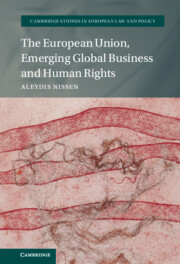Book contents
- The European Union, Emerging Global Business and Human Rights
- Cambridge Studies in European Law and Policy
- The European Union, Emerging Global Business and Human Rights
- Copyright page
- Dedication
- Epigraph
- Contents
- Foreword
- Series Preface
- Acknowledgements
- Tables of Treaties and Cases
- Abbreviations
- 1 Introduction
- Part I International Perspective
- Part II Perspective of the European Union and Its Member States
- Part III Perspective of Developing and Emerging States
- 6 Case Study
- 7 Case Study
- 8 Conclusions
- Select Bibliography
- Index
7 - Case Study
The South Korean Electronics Industry
from Part III - Perspective of Developing and Emerging States
Published online by Cambridge University Press: 10 November 2022
- The European Union, Emerging Global Business and Human Rights
- Cambridge Studies in European Law and Policy
- The European Union, Emerging Global Business and Human Rights
- Copyright page
- Dedication
- Epigraph
- Contents
- Foreword
- Series Preface
- Acknowledgements
- Tables of Treaties and Cases
- Abbreviations
- 1 Introduction
- Part I International Perspective
- Part II Perspective of the European Union and Its Member States
- Part III Perspective of Developing and Emerging States
- 6 Case Study
- 7 Case Study
- 8 Conclusions
- Select Bibliography
- Index
Summary
This case study aims to investigate whether and in what ways the relations between the EU and its Member States and South Korea can be used to strengthen opportunities to appropriately regulate and remedy human rights violations in the Korean electronics industry. This study first determines the relevant social forces and historical factors in Korea. This is an essential key to a contextualised understanding of how so-called electronics chaebols are structured. Afterwards, the relevant legal commitments in the Framework and free trade agreements between the EU and Korea are discussed. These agreements lay a foundation for deeper transnational social network relations. A landmark dispute about the freedom of association and the right to collective bargaining in Korea under the Free Trade Agreement is analysed. Finally, this case study determines to which extent people in Korea can use justice institutions when they allege that their rights have been infringed by electronics corporations. All relevant mechanisms are evaluated. An arbitration case between the Korean NGO Sharps and Samsung is discussed. Ten Korean experts have been interviewed to write this case study.
Keywords
- Type
- Chapter
- Information
- The European Union, Emerging Global Business and Human Rights , pp. 248 - 297Publisher: Cambridge University PressPrint publication year: 2022

